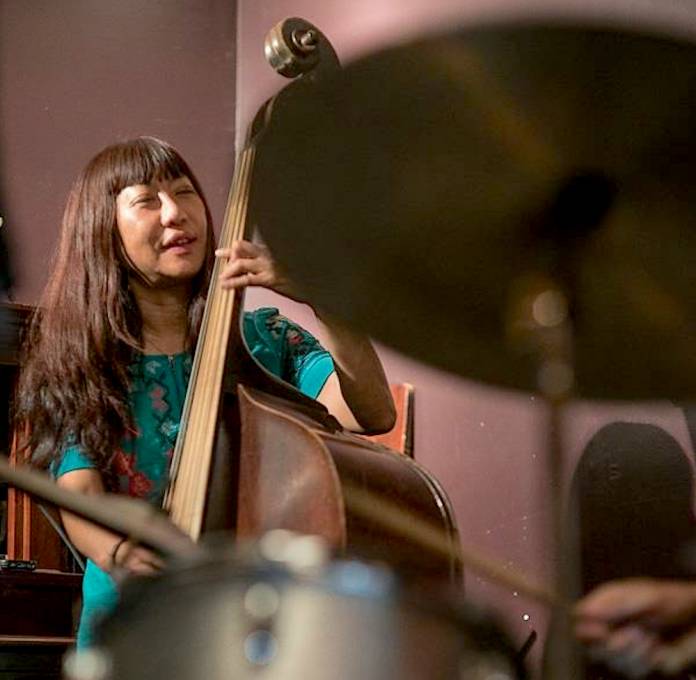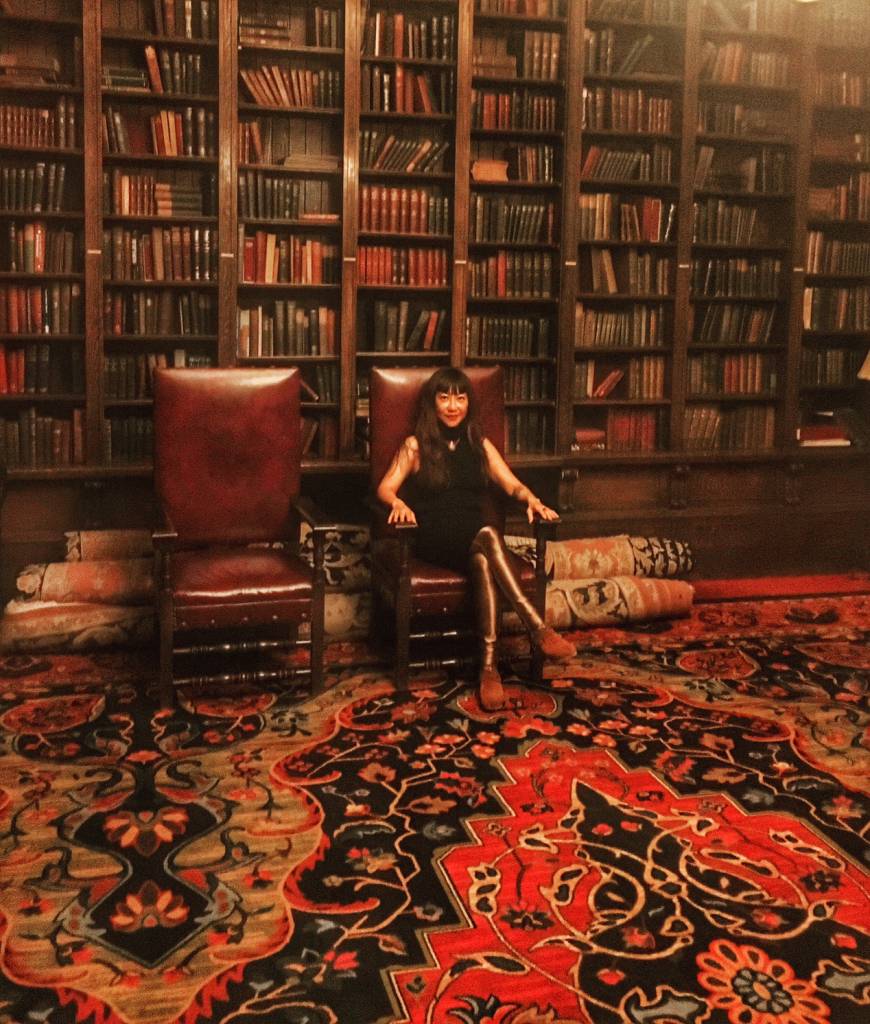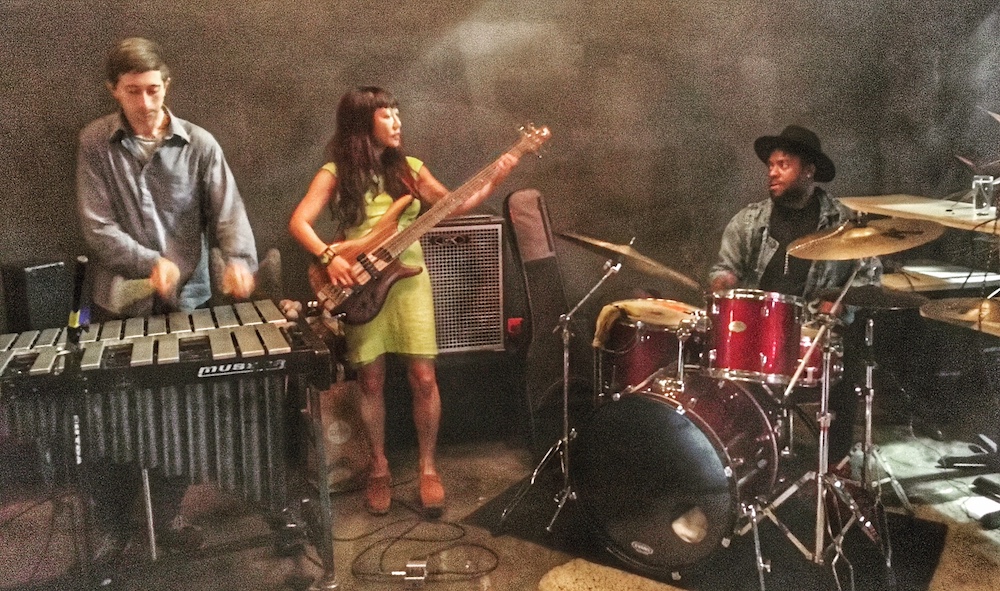
ALL EARS This isn’t the first time Caroline Chung has raised hell and fought back. The Bay Area bass player and 20-year veteran of the Bay Area jazz scene considers herself an activist at heart, advocating at City Hall for living wages for jazz musicians.
Recent events have made it abundantly clear that it’s not easy to be outspoken, particularly as a woman in a male-dominated field like jazz. Chung’s latest project, a way to claim space on the scene, is a two-night concert series entitled Women in Jazz, Fri/19 and Sun/21 at the Red Poppy Art House, that bookends Sat/20’s Women’s March. The series features musicians like drummer Ruth Price, vocalist Kimiko Joy, Chloe Jane Scott on flute, and many more.
The inspiration for the shows came from a one-line Facebook post Chung wrote about sexism in the San Francisco jazz scene that went viral among local musicians: 281 comments and counting. The post and the response to it put a spotlight on the fact that sexism, in all its multifaceted forms, is alive and well in music – even here, in the Bay Area.
Thankfully, Chung has funneled the frustration from that outburst into two lineups of all-female musicians that she hand-picked from genres spanning jazz, Latin/Brazilian, soul, and funk. The series is a gauntlet thrown down for those who say they support women in music: Here’s the venue. It’s time to show up.
48 HILLS How did you get started playing bass?
CAROLINE CHUNG I grew up in Jacksonville Florida, and I went to the arts high school in Jacksonville. I actually was in there for visual arts, but my mother made me and my sister take classical piano lessons as we were growing up. I started doing music on my own when I was in high school and taught myself to play guitar, and eventually I switched to bass. And then I got into jazz through listening to hip-hop and learning hip-hop bass lines and stuff. When I moved to San Francisco, probably 20 years ago, I was lucky enough to save money to buy an upright bass, and I’ve been focused on jazz ever since.
48 HILLS Why were you drawn to jazz, as opposed to other styles?
CAROLINE CHUNG I feel like jazz is the ultimate challenge for a musician. It’s so rich in history – you could spend your whole life being a student of jazz – and it’s related to a lot of music that we listen to today. So it’s kind of like the history of American music.
48 HILLS For those who aren’t familiar with your work, can you describe your career in the Bay Area so far?
CAROLINE CHUNG I’ve played in a bunch of bands throughout the years. I’ve always played in Brazilian and Latin bands as well [as jazz]. I played in a band called Brazuca Brown for many years. We were one of the rotation of Brazilian bands when they had Brazilian Night at the Elbo Room. Then I started my own project called Citizens Jazz. I gig around, playing jazz under that name, with a rotation of musicians. And then I played in a band called Sang Matiz, and we opened up for the Buena Vista Social Club at Mountain Winery on their last US tour. Currently, I’m just playing gigs and putting on events like this, and hopefully trying to get involved in another original music project because I feel it’s important to be making original music.
48 HILLS I have to ask you about the Facebook post you wrote that started a huge discussion of sexism in jazz, and in Bay Area jazz in particular. It was a one-liner: “Sexism in the white boy jazz scene in SF is real and it is gross.” You’ve said there are a career’s worth of snubs that feed into that feeling, but what was the spark that made you write it?
CAROLINE CHUNG Just not being recognized or treated like a musician when you’re in a room full of musicians. That night, it was a special occasion because we had some musician friends from out of town who were in town, and I was playing a private gig down the street, so we all met at this bar where our other friends were hosting a jam session. These [the hosts] are guys that I’ve known for many, many years – they’re the ones that I grew up around within the jazz scene. I knew that they weren’t going to ask me to play. They’ve always been that way.
And I show up and carry my upright bass in the bar, and everyone notices me: I’m dressed up, I’m carrying this huge instrument. Throughout the night, some other friends of ours show up, and after being there for a few hours, I realized that every one of them got asked to play, except me. And that’s when I just grabbed my instrument. I was like, “Fuck this,” and I left, and I wrote that post. It’s nothing new, but I was just fed up.
48 HILLS That post was just a primer on sexism. For anybody who doubted that sexism was rampant in the white boy jazz scene, all they have to do is read your post and all the responses to it. It’s all in there: from guys telling you to just play your instrument better, to artists like Scott Amendola and Howard Wiley standing up for you, and everything in between. What was your take on the response?
CAROLINE CHUNG Well, I definitely got a lot of support from people: There are people who sent me private messages apologizing if they ever gave me that vibe. But usually those aren’t the guys that are giving me that vibe in the first place. Like with that guy who said, “Just play your instrument better,” he’s actually a friend, and he’s someone who I play with on occasion.
We had just played a private gig, and it was not a good gig. I had a friend in town who’s a drummer, and I had hired him for the gig to be nice, even though he hasn’t been gigging or practicing. So he was shaky – his time was off. So then, [name redacted] says to me later, “I think you need to work on your time, though, because it was really off that night.” And I had just played a week of great gigs with various other musicians. So even when a man is off and not playing well, they will still assume that it’s the only female on the gig who’s at fault.

48 HILLS You mean, he couldn’t even tell it was the drummer and not you whose timing was off?
CAROLINE CHUNG Yeah, and that’s kind of how it has always been. It’s like, you can either start to believe them – which for many years, I did believe that I was not good enough, and I would never be good enough, and that I should just give it up – and I know women who have. Or you can just choose not to believe them, and create your own path.
And I do agree that men play differently from women. They are definitely more aggressive: louder, and play more notes, and all that. That’s their sound, so in their mind, that is what is considered good, and everything else is not.
48 HILLS That reminds me of something Diana Gameros was talking about: She worked with Women’s Audio Mission to record her latest album, and she said that the feminine vibe and the sense of supportiveness in the recording studio really opened her up musically and produced a better album. It makes you wonder how much good music we’re missing out on by not having female sound engineers, or by not appreciating a more feminine aesthetic in jazz.
Do you think the sexism is worse in jazz and than in other genres?
CAROLINE CHUNG Jazz is definitely the worst.
48 HILLS Why is that?
CAROLINE CHUNG Because it is the most challenging style, and I think that men like to claim those challenges to be theirs. Even in the schools. There’s been articles about the really well-known jazz schools in New York: students coming out about sexual harassment and just not being treated equally, and not being recognized for things when they deserve it – all that kind of stuff.
48 HILLS I also wanted to ask about the race intersectionality piece of it. I think part of the rabid response to your post was that you called out white jazz musicians in particular. In your experience, how does race interact with sexism in jazz?
CAROLINE CHUNG I can say for a fact that, in all the years of me playing jazz, the only guys that have hired me are the black jazz musicians. I think that speaks volumes right there. The black community, I think, they’re also brought up in the church, they’re brought up in this environment where you mentor people, and you uplift them. So, I think that they see me as somebody that they can help.
That’s not how it is with the white boy jazz scene at all. They’re very much an all-for-yourself kind of thing. I think that part of why they don’t ask me to sit in in these scenarios is they don’t want me to get all the attention. If I sat in where it’s all white dudes, and I’m playing just as good as them, then all the attention goes to me. They don’t want that, right?

48 HILLS It’s so great that you channeled the frustration from that conversation into a new Women in Jazz series at the Red Poppy. This is the second time you’re putting on this series. What was your impetus for doing it the first time?
CAROLINE CHUNG I just felt like not enough women were being recognized, and I wanted to have something where they can all come together. I was actually not thinking about even doing it again because it’s a lot of work with little pay, but then that sexist comment post kind of sparked the energy.
48 HILLS The lineup is a who’s who of female vocalists, but are there any instrumentalists you’d like to highlight, in particular?
CAROLINE CHUNG There’s quite a few of them. Some of these women I’ve known about for many, many years and never met. For instance, Ruth Davies, who is also an upright bass player, and Tammy Hall, who’s playing piano. They’re older than me generationally, so they’ve played with a lot of the older jazz cats from the Bay Area. It’s a mix of ages because then I have Ruth Price on drums, and she’s a really badass young jazz drummer.
Even with all of them, it was still hard for me to find certain – I found one horn player, but it was hard to think of many women who’ve been doing it. And so I have Madeleine Duran on sax, and she’s a great veteran player.
48 HILLS What do you hope that both the musicians and the audience will get out of these shows?
CAROLINE CHUNG Some of these women have never met before, so I think this is a really great opportunity. Last year, it was amazing to just bring all of them together, and to just have that energy is really nice. It happens to be on the weekend of the Women’s March, so hopefully it will inspire women to keep playing and keep pursuing their dreams.
48 HILLS What are the other bright spots? Do you see other communities or venues that elevate women musicians?
CAROLINE CHUNG There’s an independent jazz non-profit that sprung up called the Neighborhood Jazz Association, and they put on their own shows and do their own promoting. I feel like a lot of people are taking charge a little bit more with house concerts – being more creative with how they can present their music. And I also believe that there’s more solidarity happening amongst women in general that I think will inspire women to do more and to stick with things that they’ve been passionate about.
BAY AREA WOMEN IN JAZZ
Featuring Caroline Chung, Adriana Marrero, Kimiko Joy, and many others
Jan/19, 8pm, $20-$25
Jan/21, 7:30pm, $15-$20
Red Poppy Art House, SF
Tickets and lineup for Jan/19 available here
Tickets and lineup for Jan/21 available here


